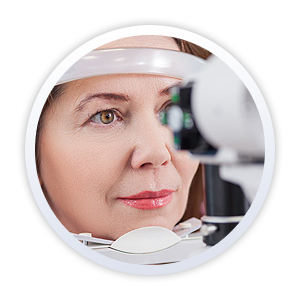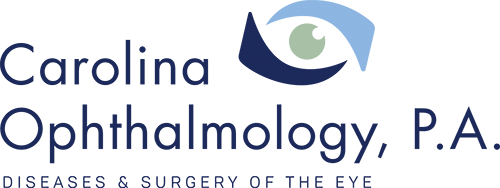By age 65, one in three Americans will have a vision-impairing eye disease. Many sight-robbing conditions can be effectively treated if detected early enough, in many cases limiting or eliminating the damage to eyesight. During the month of May, Carolina Ophthalmology, PA joins the American Academy of Ophthalmology in sharing valuable information about how to take care of your vision.
Common Eye Diseases
Four eye diseases — age-related macular degeneration (AMD), diabetic retinopathy, glaucoma and cataracts — account for most cases of adult blindness and low vision among people in developed countries. Because these eye diseases cause no pain and often have no early symptoms, they do not automatically prompt people to seek medical care. But a thorough checkup by an ophthalmologist — a physician who specializes in medical and surgical eye care — can detect them in their earliest stages. Early treatment is vital because it can slow or halt disease progression or, in the case of cataracts, restore normal vision.
A thorough eye exam can also detect other health conditions, such as stroke, cardiovascular disease, diabetes, high blood pressure, autoimmune diseases, sexually transmitted diseases and some cancers. It’s not uncommon for a trip to the ophthalmologist to actually save a life.
The physicians of Carolina Ophthalmology, PA urges you to follow these simple steps to take control of your eye health today: Get a comprehensive medical eye exam at age 40. Early signs of disease or changes in vision may begin at this age. An exam by an ophthalmologist is an opportunity to carefully examine the eye for diseases and conditions that may have no symptoms in the early stages.
Steps Take Take Control Of Your Eye Health
- Know your family history. Certain eye diseases can be inherited. If you have a close relative with macular degeneration, you have a 50 percent chance of developing this condition. A family history of glaucoma increases your glaucoma risk by four to nine times. Talk to family members about their eye conditions. It can help you and your ophthalmologist evaluate your risk.
- Eat healthy foods. A diet low in fat and rich in fruits, vegetables, and whole grains, benefits the entire body, including the eyes. Eye-healthy food choices include citrus fruits, vegetable oils, nuts, whole grains, dark green leafy vegetables and cold water fish.
- Stop smoking. Smoking increases the risk for eye diseases such as cataract and age-related macular degeneration. Smoking also raises the risk for cardiovascular diseases which can indirectly influence your eye health. Tobacco smoke, including second-hand smoke, also worsens dry eye.
- Wear sunglasses. Exposure to ultraviolet UV light raises the risk of eye diseases, including cataract, fleshy growths on the eye and cancer. Always wear a hat and sunglasses with 100 percent UV protection while outdoors.
“Vision is one of our most vital assets, and it is imperative we do whatever we can to protect it,” said Pooja Sethi, MD, general ophthalmologist with Carolina Ophthalmology. The good news is many eye conditions, if caught early, are treatable and the prognosis can be very good. Interestingly, many potentially harmful eye diseases can often be picked up in their early stages before patients notice any visual complaints; further emphasizing the importance of regular eye screenings with trained ophthalmologists.”
For more information about eye health and how to protect your eyes, visit the patient education section on Carolina Ophthalmology’s website or the Academy’s EyeSmart website.
About Carolina Ophthalmology, PA
Carolina Ophthalmology was founded in 1980. Since that time it has grown to become one of the foremost ophthalmic centers in the country. Their offices are located in Hendersonville, Asheville, Skyland and Columbus, and satellite locations in Franklin and Spruce Pine, NC. Collectively, their doctors have over one hundred (100) years of experience serving the people of Western North Carolina. To schedule an appointment with one of their qualified surgeons or for more information, please call 800-624-6575 or visit their website at www.carolinaeyemd.com.




